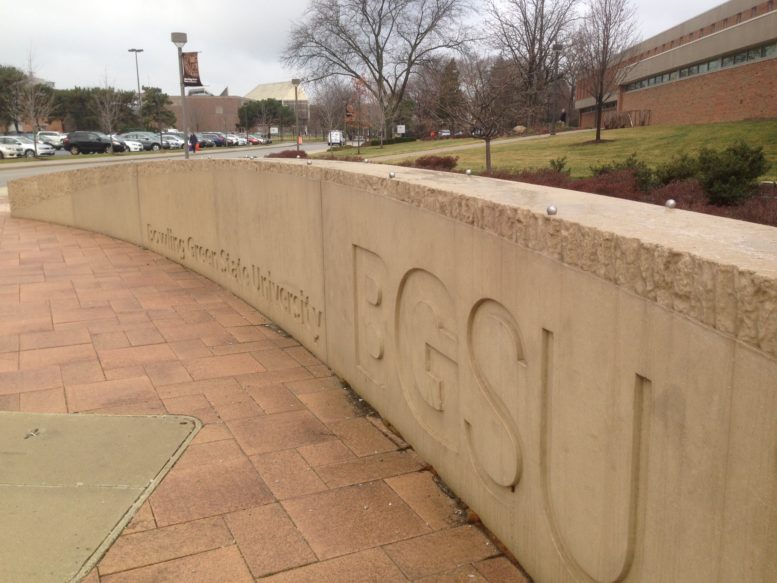By DAVID DUPONT
BG Independent News
Most people surveyed at Bowling Green State University oppose allowing concealed carry of weapons on campus.
Of more than 5,700 faculty, staff, administrators and students surveyed, 61.4 opposed allowing concealed carry and 38.6 were in favor. The survey was done by a committee charged with studying the issue after the State House voted to loosen the restrictions on concealed carry on college campus and other currently restricted zones. The bill, House Bill 48, is still before the State Senate. If it became law, the university trustees would have to approve allowing concealed carry on campus.
The committee also found a majority would not feel safer if anyone, including students 21 and older, could carry concealed weapons on campus.
That was especially true of women, of whom 74.6 percent said they’d feel less safe, and faculty members, 88 percent of whom would feel less safe.
Having concealed carry found greatest support among undergraduate males, 42.7 percent of whom said they would consider carrying a weapon if allowed.
Alfred DeMaris, a sociology professor and statistician, said the committee made an effort to reach out to all segments of the campus community. The committee distributed 20,338 surveys, and got 5,792 back, a 28.5 percent response rate. While the committee hoped for more, he noted that this was not a target sample, but the entire target population. Graduate students had the best response rate of almost 70 percent, followed by faculty with just shy of 50 percent. Undergraduates had the lowest response rate, under 20 percent.
The committee, which was charged to studying the issue and any possible response, did not present a resolution for the senate to act on. The committee had far too many divergent views on the issue to formulate a resolution, said Laura Sanchez, of sociology, who presented the report to senate with DeMaris.
In the cover letter to the report, which has been distributed to faculty, committee chair Ian Young wrote: “No clear overwhelming consensus view on CC was found among the respondents, although some interesting trends did emerge. Given the range of views within the BGSU community as a whole, this reinforced our previous conclusion that it would not be justified or appropriate for the HB-48 ad-hoc committee to draft a resolution that advocated any policy that the university community ought to implement as a response to HB-48 We did feel however that the survey has yielded some useful data that should be taken into account by the Board of Trustees and others who may be in the position of making a decision on the university’s response to HB-48. “
Joel O’Dorisio of the School of Art, said that given the faculty’s stated opposition to conceal carry, a resolution should have been put forward. While it’s important to take into consideration the views of other contingencies, he said, the Faculty Senate represents the faculty.
Senate President Allen Rogel noted that there are multiple ways for resolutions to be brought before the body, and that one could still be put forward. That would not be until fall. This was the senate’s last session of the semester.
Sanchez said she was surprised by the open-minded approach taken by many of the respondents. “Very few were really entrenched in their opinion.”
Among the findings were:
- If faculty and administrators only were allowed to conceal carry, 41.6 percent would feel less safe, 29 percent would feel safer.
- If anyone anyone with a concealed carry license, including students, was allowed, 66.5 percent would feel less safe, and 20 percent would feel safer.
- Of those surveyed, 7.4 percent now have concealed carry permits with 65 percent saying they would carry if allowed, and 25 percent would plan to get a permit if allowed on campus. Undergraduates are most likely to carry with faculty and administrators less likely.
- “Males are more likely to favor carrying guns than females, although a majority of both genders opposes it. Nevertheless, 47.8 percent of males vs. 31.55 percent of females is in favor of guns on campus.”
- Main arguments in favor of allowing concealed carry on campus: ” Good guys with guns can stop bad guys with guns; bearing arms is a second amendment right; concealed carry permit holders are responsible with substantial training; gunfree zones are victim zones, banning concealed carry makes BGSU a ‘soft target’; and one’s own category should be permitted to conceal carry, other BGSU sub-populations should not.”
- Main arguments against: “Campus concealed carry is a bad policy; only the police should carry guns; campus concealed carry will greatly reduce safety; greater risk of injuries, deaths, accidental discharges, intimidation; dangerous to let undergraduate students conceal carry — greater risk of suicides; campus concealed carry threatens the mission of BGSU — threatens academic freedom, increases anxiety and universities have a special mission antithetical to guns; recruitment and retention will be negatively impacted; and campus concealed carry will make sub-populations even more unsafe.” Graduates students were particularly concerned about the implications for racial and ethnic minorities, gay and transgender students, international students and religious minorities.




